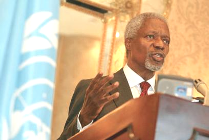UN’s Annan proposes expanding Security Council, reforming HR Com
NEW YORK, Mar 20, 2005 (AP) — Secretary-General Kofi Annan on Monday will propose restructuring a U.N. human rights panel, ask for a swift decision to expand the Security Council and request sweeping changes designed to prevent new scandals in a report Monday, the Los Angeles Times reported.
 The blueprint for reform, according to a draft copy obtained by The Times, also proposes ways to keep the U.N. the primary setting for global security decisions and the key player in international development issues.
The blueprint for reform, according to a draft copy obtained by The Times, also proposes ways to keep the U.N. the primary setting for global security decisions and the key player in international development issues.
The reforms depend on the endorsement of the 191-member General Assembly and the agreement of world leaders who are coming to a U.N. summit in September.
Many of the ideas in the document have been floated in recent months by special panels on U.N. reform and global development that Annan commissioned. But fierce reactions from some governments led Annan to temper a proposed definition of terrorism, stop short of requiring criteria for membership on the human rights panel and caused him to refrain from choosing between two options to expand the Security Council, U.N. officials quoted by the Times said.
With the U.N. still bruised by the U.S. decision to lead an invasion of Iraq without the Security Council’s blessing, Annan has searched for ways to keep the Bush administration engaged in the world body and address the United States’ post-Sept. 11 sense of vulnerability.
In an attempt to put the U.N. at the center of security policy, the report calls for a comprehensive anti-terrorism convention by September 2006, new measures to stem nuclear proliferation and an agreement on rules for the use of force and preemptive action, the Times said.
To bolster peace and development, the report urges the creation of a peace-building body to help societies recover from war and asks developed countries to set aside 0.7 percent of their gross national income for development aid.
Only six countries now provide that amount; the U.S. plans to contribute about $22 billion, or 0.18 percent of its gross national income, in aid next year.
As the U.N. reels from scandals, the report describes ways for the U.N. to become more accountable and to hew more closely to its ideals.
Most notably, it suggests that nations that violate human rights should not have a place on the U.N. panel that monitors such actions, the Times said.
In the shadow of the failures of the U.N.’s “oil-for-food” program for Iraq, Annan suggests better oversight of U.N. contracts and sanctions, the Times said. He also requests funding for a one-time staff buyout to help younger, energetic employees rise in the organization.
The report declares a policy of zero tolerance for sexual exploitation by U.N. peacekeepers or other personnel and strongly encourages all countries who contribute troops to the U.N. to prosecute any wrongdoing because the U.N. has no power to punish them.
The proposal is also in part an appeal to the United States not to forsake the U.N. but rather to help guide the reform. “In today’s world, no state, however powerful, can protect itself on its own,” it quoted Annan as saying.
Annan became secretary-general eight years ago with firm U.S. backing to reform the organization. But the recent scandals have provided a focal point for conservative critics, who have long held the U.N. in contempt and considered it a hindrance to U.S. interests.
If Annan is able to complete the two years remaining in his term, the new blueprint may represent his last chance to achieve a legacy of reform.
In a key innovation, Annan proposes that the much-criticized 53-nation Human Rights Commission be changed to a smaller “human rights council” directly elected by the General Assembly, the Times said.
But rather than establish criteria to exclude violator nations from the council, he gently suggests that they have no place on it. “Those elected to the council should undertake to abide by the highest human rights standards,” the Times quoted the report as saying.
The current process of selecting members from regional groups has given seats on the 53-member commission to countries with questionable human rights records, such as Sudan, Libya and Cuba, making it a lightning rod for criticism, even from supporters of the U.N.
On another attention-getting topic, Annan says expansion of the Security Council must occur but he takes no stand on two competing proposals, according to the Times.
Annan wants to enlarge the 15-member council to better reflect current realities and involve more countries who contribute financially, militarily and diplomatically to the United Nations. Both proposals would increase the membership from 15 to 24 but differ on the number of permanent and elected members.
